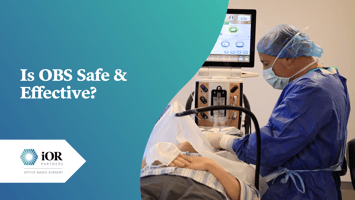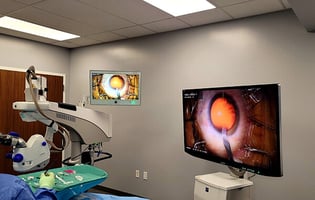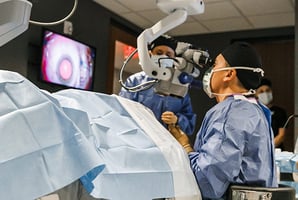50,000+ Successful Outcomes Validate Safety of Office-Based Surgery A study published in the...
An Industry Expert Discusses Medicare Reimbursement for Office-Based Cataract Surgery (Podcast Episode Recap)
The following article is a recap of podcast episode 62 of Ophthalmology Business Academy, featuring Tony Burns, Principal Founder, Chief Strategy Officer of iOR Partners, and Omar Shakir, MD and owner of Coastal Eye Surgeons. Read more for additional details.
You can listen to the podcast interview in its entirety HERE.
First, What’s Behind the Shift to Office-Based Cataract Surgery?
(Time stamp: 00:23:25)
The shift to office-based surgery (OBS) closely mirrors the transition from a hospital setting to ASCs in the mid-80s. The change was disruptive at the time, but ASCs soon became recognized as a safe, affordable, convenient choice for both patients and physicians just as OBS is today.
OBS addresses a critical supply and demand problem for the #1 procedure in healthcare. Physicians across the country are struggling for surgical time in ASCs and hospitals. Both facilities make less money from ophthalmic procedures, so they’re often displaced by more lucrative specialties. In addition, the number of ophthalmologist and anesthesia providers are declining creating a long-term capacity crisis the most common medical procedure performed in the United States.
OBS gives physicians complete control over both the surgical process and patient care. What’s more, surgeons have 24/7 access to their own OR, 365 days a year. Everything’s in one place in a state-of-the-art surgical suite that’s right down the hall.
Patients experience less stress and anxiety when their surgery is performed in a place that’s familiar to them by a team they know and trust. Surgery time is considerably less than an ASC or hospital, and recovery time is faster since in most cases there’s no IV sedation. And that means there’s no need for an anesthesiologist or CRNA.
What’s more, physicians can choose their own equipment and surgical team. Add to that the retention of all surgical revenue within the practice, and OBS becomes an obvious choice for a rapidly growing group of physicians.
And when you consider the aging population in need of cataract surgery, you’ll see why OBS is here to stay.
“Baby boomers will all reach Medicare age by 2030, and there are simply not enough surgeons or ASCs to meet that demand.”
What Are the New Developments in Medicare Reimbursement for OBS?
(Time stamp: 00:02:57)
At iOR Partners, we’re not only redefining the surgical suite we’re redefining the traditional view of reimbursement. To begin with, you can indeed receive Medicare reimbursement for OBS. You’re simply paid in a different way. Instead of a Traditional Primary-National reimbursement of the facility fee, OBS surgeons receive a Secondary-Local reimbursement of their professional fee based on local Medicare Administrative Contractor (MAC) codes in all 12 jurisdictions. Physicians also retain 100% of their surgical fees in their practice.
iOR is also working closely with 1,200 third-party payors to ensure reimbursement for OBS. We understand the regulatory and billing requirements to get you reimbursed, and we review every case, perform insurance pre-authorization, and submit all OBS claims.
“iOR has a well-established, compliant model using local payors on more than 53,700 Medicare claims.”
How is iOR Advocating for Center of Medicare and Medicaid Services (CMS) revaluation of OBS?
(Time stamp: 00:10:28)
iOR is currently engaged in productive conversations with CMS and the AAO regarding the revaluation of cataract and glaucoma codes for 2025.
It should be noted that we’re seeking parity with the value of ASCs and hospital-based outpatient cataract surgery. The Medicare reimbursement must be the same for OBS. We simply won’t settle for less.
Like the transition to ASC reimbursement, we’re confident CMS will eventually streamline national OBS reimbursements.
And Finally, How Does a Practice Get Started with OBS?
(Time stamp: 00:26:37)
iOR is the only company providing office-based surgical suites to ophthalmologists. Working with clients across the country, we’ve implemented nearly 100 suites with over 47,000 successful outcomes. And the best part? You get to focus on your practice while we take care of everything else.
Our team will facilitate a seamless transition to OBS that includes a feasibility analysis, timeline, space planning, and development, as well as staff training, equipment management, inventory management, and billing assistance. Accreditation and compliance assistance are also part of the package. Simply put, we’re there start to finish, and beyond.
“With as little as 700 square feet, iOR can plan, develop, and launch a cutting-edge surgical suite in as little as 90 days.”
Find out what Secondary-Local reimbursements are in your area with a FREE Reimbursement Analysis. Get started HERE!
——————————————
Principal Founder, Chief Strategy Officer at iOR Partners
Tony received his MBA from the University of Utah with an emphasis in Healthcare Management. He is a Certified ASC Administrator and a Certified Surgical First Assist. He has worked nationally as an administrator/consultant developing and managing over 140 Office-Based and Freestanding Multi-Specialty Ambulatory Surgery Centers focusing on Ophthalmology. As a consultant and administrator, Tony has completed over 100 CMS, AAAHC, AAAASF and JCAHO surveys.
Connect with Tony:
LinkedIn: linkedin.com/in/tony-burns-mba-casa-csfa-267270160
IOR Partners: iorpartners.com


